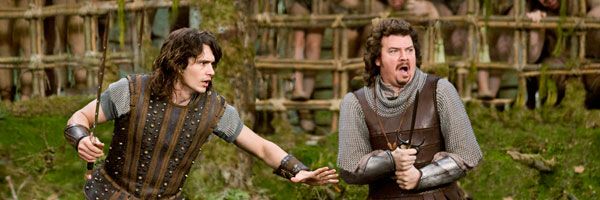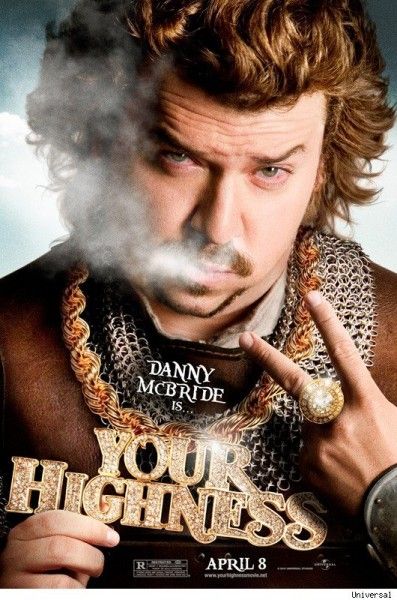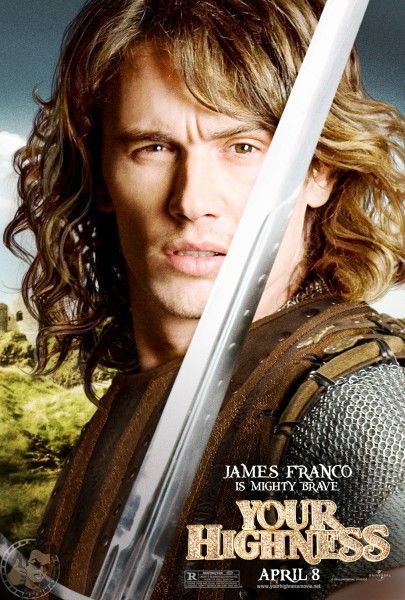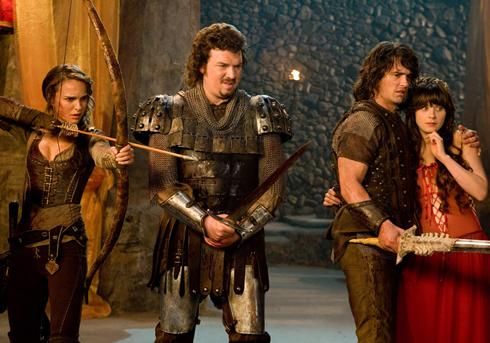In the medieval raunchy comedy Your Highness, actors Danny McBride and James Franco play brothers in the Kingdom of Mourne. Thadeous (McBride) has spent his life in the shadow of his older brother Fabious (Franco), just trying to stay completely out of harm’s way while the hero heir to the thrown goes off on quests to conquer evil. But, when Fabious’ fiancée Belladonna (Zooey Deschanel) is kidnapped by the power-hungry wizard Leezar (Justin Theroux), Thadeous must step up and help his brother and show, for the first time, that he is worthy of his family name. On their quest, they are joined by the mysterious warrior princess Isabel (Natalie Portman), who also has the goal of revenge on Leezar, and they team up to stop the ancient prophecy that will allow Leezar to impregnate Belladonna with a dragon.
At the film’s press day, co-stars Danny McBride (who also wrote the film) and James Franco talked about the challenge of selling this idea to a major studio, their surprise that they were ever allowed to make the film, improvising on set to keep everyone on their toes, and how game Academy Award winner Natalie Portman was, when it came to the raunchy humor. James also talked about why he wanted to sign on for Oz: The Great and Powerful, with director Sam Raimi. Check out what they had to say after the jump:
Question: Were there specific movies that you watched while researching this film?
DANNY McBRIDE: David Green and myself went to film school together. I was a freshman and he was in his second year of film school, and we both lived in the same dorm. I met him the first week I was going to school there. When you go to film school, you’ve got all these guys who are trying to show everyone how smart they are. When they talk about movies, they’re talking about all these pretentious, arty films because they think that that’s the kind of movies you have to like, if you’re going to film school. One of the things that David and I instantly clicked on was that we appreciate those films, at the same time appreciated movies like Beastmaster, Krull and Dragonslayer, and those fun movies that capture your imagination, when you’re a kid. It was awesome to be able to actually try to make one of those movies. It gave me a very good excuse to give my wife for why I needed to be watching Krull on repeat, all the time. I really couldn’t have gotten away with it, unless I was getting paid for it, so it was a selfish reason to make this film.
JAMES FRANCO: The first film I ever saw in a movie theater, when I was very young, was The Dark Crystal, and I saw that repeatedly in the theater. Then, there was The Never-ending Story and the original Clash of the Titans. We’d watch that on my friends’ VCR. They’re a little hokey now, but they still have a lot of charm.
Was there any wizard weed involved in the writing of this film?
McBRIDE: You know, I don’t tend to partake in much wizard weed when I work on scripts. It’s such a hard process and, if you want to do it good, it seems like if you do partake in a lot of that, people don’t tend to really want to watch the things that you come up with, when you’ve done that. With this film, when we were coming up with the idea, David and I thought that the comedy would only work, if the movie itself was approached as a serious fantasy film. That’s where we would find the comedy. So, to us, when it came time to cast the film, even with the craftsmen we pulled onto it – the guy who designed the weapons designed the weapons for Braveheart and Apocalypto, our production designer worked with Danny Boyle, and the person who designed the armor had designed the armor for Kingdom of Heaven – we really just approached the movie as if it were a serious epic fantasy, and we just found the comedy in the fact that the more serious we took the movie, the more the comedy seemed to work. In the writing of it, we thought of it as a comedy second and as an adventure movie first, and then we really tried to find that humor on the set.
How challenging was it to pitch this script to the studio?
McBRIDE: You know, the first day we came in and pitched it, we pitched it as, “This is Krull meets Barry Lyndon,” and the executives were like, “Never pitch this movie like that ever again.” But, to us, that is what it was. We wanted to approach it as a serious drama, but at the same time have that fun that we had with a movie like Krull. That was always the concept. That was what was interesting about taking on this project. It was about making a legitimate fantasy/adventure movie while still finding a way to find comedy in it, without making it a spoof. I think that’s what interested me and Green from the beginning. That was something interesting to try.
When you’re dealing with raunchy humor like this, was there anything you were really surprised that you got away with?
McBRIDE: Well, the fact that we made this movie was very surprising to us, in the first place. David and I, the whole time, never really were convinced that someone would make this movie. To us, it was just this wild idea for this crazy movie because we wished Hollywood would take more chances and make crazier things. To us, that’s what this was. It was an opportunity to make a film that we liked, that just seemed so specific for what we wanted to see, that we were surprised that someone was going to let us do that. There’s tons of things that I can’t believe are in there. It’s the first Minotaur erection that has ever been filmed before.
FRANCO: If you think about it, it’s the first time, ever.
McBRIDE: Yeah, a lot of people have tried and have not been able to accomplish it, but we did it.
Was there a lot of improv on set?
McBRIDE: There was a ton. I’ve worked with David a few times before and, even the way we worked on Pineapple Express, or the stuff we’ve done on Eastbound and Down, we always tend to do one or two takes of what’s on the page. Then, from there, we just start pushing it. It’s not always even just to find jokes. We’ll just improv, so that everyone in the scene is on their toes and you find that reaction that maybe you wouldn’t have gotten, when the actor knows exactly what’s coming next. I think improvising is essential to what we do, and there’s a ton of it in this film.
FRANCO: Yeah, when you have a movie where you improvise during every scene, it’s not just about finding funny lines. It does something to the actors because you’re more aware. You don’t know what’s coming next, so you don’t get lulled into a way of doing the scene the same way, one time after another. You’re much more aware, and it does something to the behavior. It makes it more immediate and more alive. And then, David won’t have you just improvise different lines. He’ll have you say it in very weird ways. He’ll say, “Say it like a robot,” or, “Say it like you’re taking a big dump.”
McBRIDE: That was a direction he gave to Charles Dance, at one point. It was very funny to see his reaction. He was just like, “What have I signed up for?”
Which scene was the hardest for you guys to get through, without cracking up?
McBRIDE: You know, surprisingly, the scene that I couldn’t get through was the scene I had to do with Natalie, where we’re sitting at this table in the tavern and I have to confront her about stealing the compass. The way David Gordon Green directs, he’s literally right out of frame of the camera, and he stands there and makes you say the most ridiculous things, and you can’t really hesitate. You have to just keep going through with it. In the scene, he was just like, “Call her a bully and a whore.” So, I just did it without thinking about it and, as soon as I looked at Natalie and the word “whore” came out, it just felt horrible and I couldn’t get through it. I had to keep doing it, over and over. That, weirdly, was the hardest thing for me to get through.
FRANCO: I think we had a hard time with the wise wizard, too. We were acting with a puppet and we were short on time that day, so it was actually causing problems.
McBRIDE: We couldn’t finish it.
FRANCO: So, that was a scene that was hard to get through.
In your historical research, did you find that the mullet was a common hairstyle in medieval times?
McBRIDE: Well, historical accuracies were very important to us, in this film. We really wanted to make this an educational film and show kids that people back in the middle ages, when there were two moons, acted just like people do now. We really were modeling that haircut off Mel Gibson in Lethal Weapon. That was what we were going for with that haircut. They rocked the Mel Gibson Lethal Weapon haircut back then.
What was Natalie Portman like to work with, and how did she fit in with everybody?
McBRIDE: David had been in talks with Natalie about another project and, once we started to get some movement on Your Highness, it looked like that was what was going to be next. In his conversations with Natalie, she brought up this project and was saying that she was dying to do a comedy and really wanted a chance to work with us. We were thrilled by that because, having actors like James and Natalie is what separates this movie. It’s not a movie that’s just filled with your typical comedians. It’s cast with a lot of prestigious actors and that, to us, is what made this movie unique and fun. Honestly, I was really embarrassed to hand Natalie the script, for the first time. I was like, “Should I go through and take out all the dirty stuff? I’m nervous to show her this.” David was like, “No, we’ve got to let her know what she’s in for.” But, she was a total champ. The stuff that I thought would make her blush is the stuff that she thought was funny. She totally embraced it. On the set, she never shied away from that stuff. She could definitely hang with the boys. She wasn’t intimidated by any of the foul stuff going on.
FRANCO: No, she wasn’t. She embraced it.
Can you talk about working with the actor who played Courtney, and how you found him?
McBRIDE: Courtney was played by Rasmus Hardiker. It was one of those deals where we had been auditioning all these guys for that role and, as soon as we saw him, before he even came in the room, we just knew, “This is our guy.” He was sitting in the waiting room and, out of all these people, you could identify that that was going to be our guy. He’s comedically just brilliant. He’s fast on his toes and he just killed that role. He was a lot of fun to work with.
James, you’ve been in serious epics. Did any of that experience help you with this?
FRANCO: It’s interesting. Somebody earlier today said that we might have ruined this genre for anyone that wants to treat it seriously because it really is hard to make an earnest fantasy film. Until The Lord of the Rings and maybe the Harry Potter series, there haven’t been too many of these films that have been embraced by an older audience. Usually, they’re thought of as kids’ films. People think of heroes in a different way now. Because this had a comedic element to it, you can get away with that. I actually tried to play the character pretty earnestly. Because it’s a comedy, we can get away with a lot of the cheesiness that maybe can hurt a film that’s completely earnest. Because we get away with it, then you can actually address some of the real feelings and dynamics between brothers and jealousy and feelings. That’s the secret of bromances. You can talk about relationships between guys and brothers because it’s a comedy. If it was not a comedy, it would probably just be boring or cheesy or kinky. If you go the kinky route, that could work.
What kind of training did you do for the swordplay?
FRANCO: Danny was the writer and he conveniently wrote his character as someone that was very bad at using swords, so that he didn’t have to train at all. I trained a bit, but I had done, literally, nine months of training, seven days a week for Tristan & Isolde because I was a young actor that didn’t know any better. That was insane. I didn’t get to use much of it in that film, so I got to use it in this movie.
Danny, have you ever cleaned up your act to be the hero for a woman?
McBRIDE: Well, despite how I may come across on screen, my act is pretty clean. I tend to play it clean. I got married last October, so I have cleaned my act up. I was born in the South and was raised to respect ladies and be a gentleman, so that’s something that’s always been important to me.
James, your work has become so prolific that they’ve even spoofed it on SNL.
FRANCO: Not very well though. That guy didn’t look like me, at all.
How do you feel about the public perception of your work?
FRANCO: Well, that’s hard. It’s out of my hands, really. I went to school for myself. Sometimes, I forget that it’s actually not a public act. I’m just there to learn and better myself. That part of my life is not a performance, but in some ways it has become material for public discussion, to the point where the New York Times is interviewing my teachers. But, I don’t mind. I’m proud of everything I’m doing. It’s just that part of my life is a performance and I perform as a job, and part of it is not, but I can’t control the attention.
You’re directing films, acting in a number of films a year, and we keep hearing your name attached to things.
FRANCO: Well, there’s also this phenomenon where people do like to announce movies that they think I’m doing, that I’m not. Somebody just doesn’t have the time to do all the movies that people claim that I’m going to do. I have acquired the rights to a lot of books that I love, and I think it helps the writers to sell their books, if they announce my attachment, but it doesn’t mean that I’m going to make the movies in the next year, or two, or three.
But, Oz: The Great and Powerful is one film that you’re actually attached to, right?
FRANCO: Yes.
What made you want to take that on?
FRANCO: I love the idea of working with (director) Sam [Raimi] again. Sam is a master of combining classic Hollywood character types and storylines and ideas, and then matching that with innovative technology. I really think he’s going to build an incredible world, but a world where we have room to play and have fun.
Is there an end to your work on General Hospital, in the near future?
FRANCO: No, there’s going to be a lot more awesome, groundbreaking stuff, truly.
Danny, between Fred Simmons, Kenny Powers and this character, how do you modulate your comedic archetype?
McBRIDE: When we did The Foot Fist Way, that was a really independent film that we shot for $70,000, in 17 days. We didn’t have a lot of time, and Jody [Hill] and I hadn’t been writing things like that, before that movie. I think we started approaching the story in figuring out that, if we could change who the protagonist is and try to get the audience to align with someone who isn’t typically who you align with in films, it would open up all these different comedic possibilities for where the story could go. With Foot Fist, we were just starting to scratch the surface with that, and we wanted to do more with it, but we had just blown our load on this independent film. That’s why we set up Eastbound and Down, so we could have a way to explore that architecture in a story.
It was, “Let’s take this convenient and almost clichéd story about an underdog, but let’s put the audience with someone who they are not used to following.” That was the design between those things. When it came time to approach this, with the fantasy, it was one of those deals where it was like, “How do we find our stamp? How do we find our way here?” Following your typical hero-on-a-fantasy quest, it just felt like the only way we were going to be able to find comedy was if we made the fantasy and the action silly. So, once again, it was just shifting that lens of who you typically follow, in these sorts of films, and trying to find someone that’s a little bit more unexpected. It just allows you to hit some of those clichéd moments with a new perspective. To us, that’s comedically what was interesting about it, and what separated it from other films that are in this genre. It’s just a fine balance.
I always come from a place of story, so you’ve got to find those layers of how exactly you’re going to get an audience to root for someone that is so morally corrupt, or makes these bad choices. For each character, it’s a different thing. With Fred Simmons, he was dealing with adultery, loss and betrayal, so it was about, “How do you have a guy do this, but still find redemption?” With Eastbound, it’s the same way. You just try to figure out what their wound is and how you can get an audience to get behind that wound. In this film, it was based on sibling rivalry. It was based on someone who felt like he was living in the shadow. It’s just a matter of figuring out how can you play around with that, and how can you get someone to identify with this person that normally they wouldn’t identify with.




